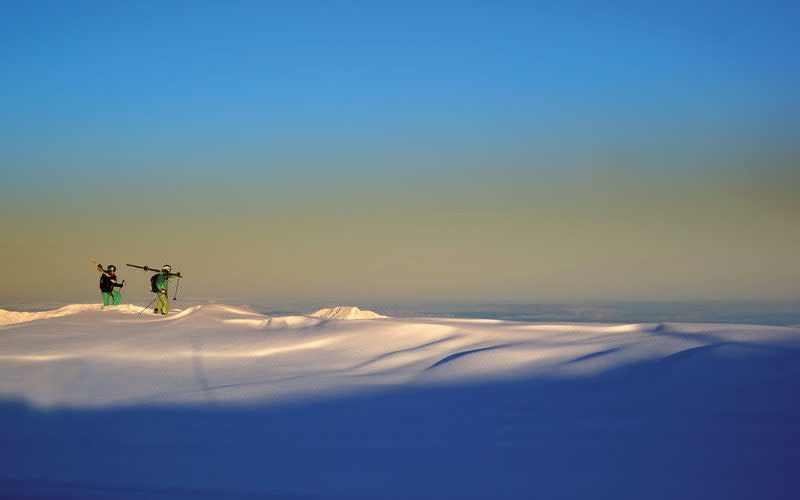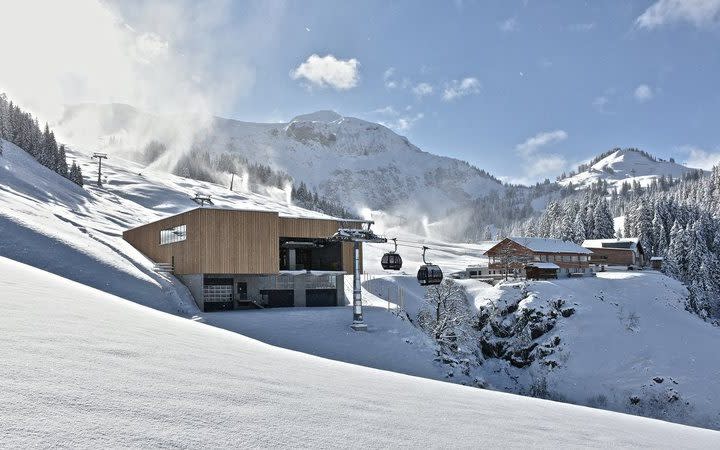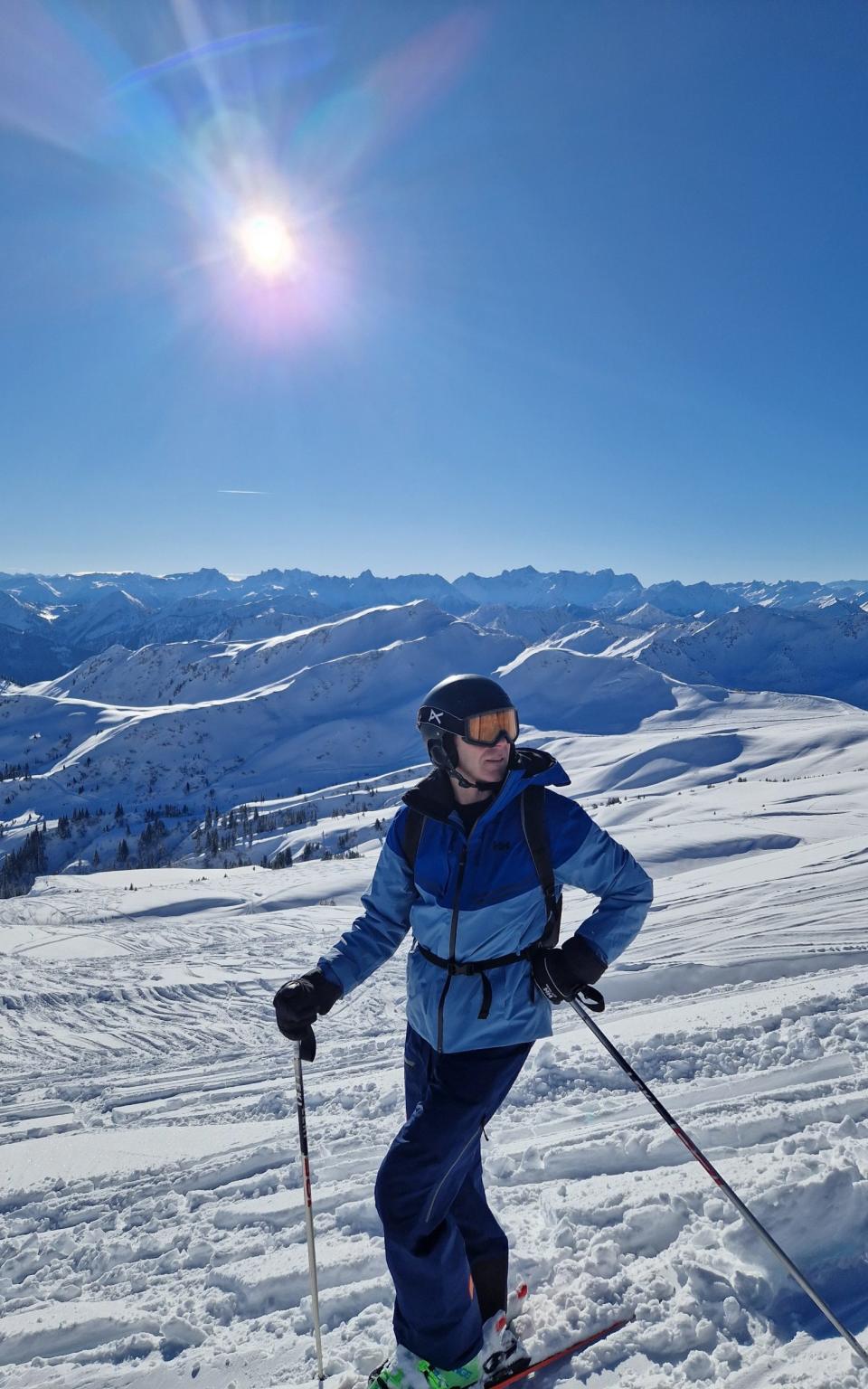Skiing in ‘the world’s snowiest village’

Claiming to be “the snowiest village in the world” is a tall order. But it’s one that Damüls, an unknown Austrian gem found tucked away deep in the Bregenzerwald mountain range, stands by.
With a base altitude of 4,700ft and an average of more than 30ft of snow per season, this small, perfectly formed resort in Vorarlberg, the westernmost province of Austria, boasts guaranteed white in winter – all for an affordable price.
The claim could be as much marketing hyperbole as geological fact, but when I arrived in mid-December, there was already ample cover from top to bottom. The season was well under way with typical Austrian efficiency – not only were all the pistes open and immaculately groomed, but there was also a magical covering of virgin powder off-piste laid on. What’s more, I didn’t hear a single English voice the entire trip. I couldn’t believe my luck.
Undisturbed skiing
With nearly 70 miles of pistes, the ski area in Damüls is substantially smaller than the 190 miles offered by St Anton, its more famous and glamorous neighbour located an hour’s drive away, but the lift system (many covered and heated) is every bit as good as in the leading resorts. Even on the busier weekend days, the lift queues were never more than a few minutes’ wait and, unlike in the internationally acclaimed St Anton, most of the skiers I met on the slopes were local or from southern Germany or Switzerland.
Damüls is split into three distinct, well-connected areas: Faschina, Mellau and Damüls. Each has plenty of wide blue runs – ideal for intermediate or adventurous beginner skiers who can relax knowing that at the top of every lift, there is an easy route down – and more challenging red runs. The limited smattering of expert terrain – a handful of black pistes – was more than made up for by off-piste areas facing every conceivable angle.
With uncrowded slopes, I was still skiing fresh terrain several days after my arrival and enjoying the relaxed and ultimately safe atmosphere, having fewer people on the pistes present.

Comfort over conga lines
Damüls spans a mountain road that snakes across two peaks located on either side of a valley. Both sides are peppered with hotels and self-catering apartments, yet there is no discernible lively village centre – something that attracts thousands to the streets of St Anton and Lech each winter. While there are a supermarket, tourist office and the ubiquitous Intersport rental shop, plus a ski-in/ski-out church and an FIS Ski museum, if you are looking for thumping nightlife then Damüls is not the place.
But that needn’t be the end of the world; it certainly isn’t when you reach a certain age and the comfort of a friendly hotel is just as enticing as dancing on tables at the MooserWirt was 20 years ago. My base at the half-board Hotel Hohes Licht, a refined and supremely comfortable family-run spa hotel, was a prime example of the balanced luxury-versus-value concept that Austrian resorts have long perfected. Frankly, with everything I needed in the hotel, it’s debatable as to whether I would have ventured out even if there had been a central village to explore.

Value for money
Skiing in the Alps will never be cheap, but I was pleasantly surprised at how much more affordable Damüls was compared with its neighbouring, better-known resorts. A six-day adult pass in Damüls costs about €100 (£85) less than in St Anton and a four-hour private lesson costs €330 (£282) – whereas in St Anton, it would set you back just over €400 (£342). Using the “Goulash Soup Index”, in Damüls this Austrian lunch staple costs no more than €7 (£6) – the same dish typically costs €11 (£9.40) in the Arlberg’s biggest name.
This amounts to a significant price difference, especially for families, and that’s before you factor in accommodation costs. A six-night half-board stay in a double room cost little over €1,000 (£850) for two people, excluding travel. A similar package in St Anton would have set me back up to 50 per cent more.
Affordable ski resorts are generally better value for a reason, and often it’s because they are less likely to be able to guarantee snow or the infrastructure to satisfy a week’s skiing.
Whether or not you choose to believe the claim that it is the snowiest village in the world (unofficial title in 2006), Damüls proved to be a less risky snow choice in these climatically chaotic times. That, and its unquestionable affordability, makes it an unsung European ski hero worth knowing about.

Five top tips for exploring Damüls
1. Tobogganing. Take the Uga lift up, sip some Dutch courage at the Gasthof Elsenalpe and off you go. Your author remains the family champion. €8.10 (£6.90) per day.
2. Hiking and snowshoeing. A two-and-a-half-hour circular WinterWanderWege route allows you to enjoy snow-deadened silence in pine forests with wonderful vistas and mountain huts on the way. Join a guided tour for €12 (£10.20) per person.
3. Lunch at the Sonnenalm. Discover the best goulash on the mountain and a large sunny terrace, or if the weather is foul, plenty of Gemütlichkeit (Austrian cosiness) inside.
4. Top ski run. My favourite was the long back-country ski route 8, from the top of the Ragaz lift. Enjoy lots of different pitches through trees after a high-level traverse with oodles of off-piste options.
5. Après-ski. Enjoy a civilised sundowner at the Gasthof Elsenalpe followed by a mini rave at Heike’s Schirmbar (but don’t expect the MooserWirt).
Essentials
Getting there
British Airways, SWISS and easyJet all have direct flights to Zurich and/or Innsbruck from the UK, both of which are approximately 105 miles from Damüls, and prices start from £100. Train transfers from Zurich to Bregenz, if booked in advance, cost approximately £20 each way, bookable via sbb.ch.
Where to stay
Hotel Hohes Licht is a four-star, ski-in/ski-out hotel with pool and spa facilities. A seven-night, half-board stay for two people costs €2,492 (£2,128) in total, excluding travel, departing March 30.
Simon was a guest of the Bregenzerwald Tourist Board and the Hotel Hohes Licht.


